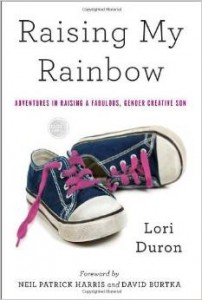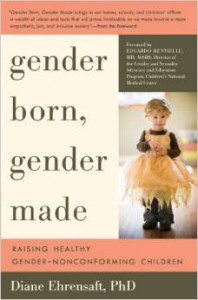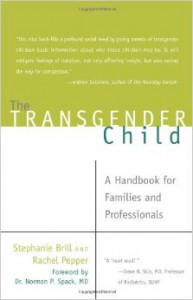
Source:
http://aramatheydidnt.livejournal.com/3397863.html
For illustrative purposes only. Actual a herbivore boy 🙂
When I first knew my teenager was genderqueer and possibly transgender, I was desperate for information. As a parent, I had no idea how to support my transgender kid, other than just love them. I knew I would make some significant mistakes if I didn’t learn more. My kid was checking out before-and-after surgery videos on YouTube, but me, I was looking for library books!
Fortunately, I found books by “real people” authors who made the experience more concrete for me. I read books like My Gender Workbook by Kate Bornstein, The Nearest Exit May Be Behind You by S. Bear Bergman, and Nina Here Nor There by Nick Krieger. They were helpful and hopeful. Yet, all of these authors made their gender transitions as adults. So I could only guess at the support they wished they had from their parents. The one parent/child co-written book, What Becomes You, was rather vague on the whole parent/child relationship.
So I was taken aback when I checked the library catalogue recently and found three books for parents like me! A couple of years too late,since my kid now lives independently, but hey, I can always recommend them to others.
Here are some of the things I wondered about in the early days of learning about trans issues:
- How do I know if this is real or just a phase?
- Who can I tell? Who can I talk to?
- Do they need professional help? Do I?
- Will my child be safe? Happy?
- What are the things you do (or could do) to live as another gender?
- What is the medical process like? What are the non-medical options?
- How might my child act and feel as they go through these steps?
- What do you do about legal names and IDs?
Book 1: Raising My Rainbow: Adventures in Raising a Fabulous, Gender Creative Son – by Lori Duron (2013)
Based on the blog raisingmyrainbow.com
I had to set aside all my questions when I read this book. It is simply the chronicle of one gender-bending child and his family, no more and no less. Other than saying, “Stick up for your child,” it isn’t full of advice. The author/blogger simply talks about their days and their decisions. Her child CJ showed a marked preference for girls’ fashion and toys starting at age 2. Now, at age 7, he continues to identify as a boy who likes girly things. He has long hair and a pink backpack. He has a gender-typical older brother. His birthday parties and holidays have included Barbies and Disney Princesses and American Girls. CJ’s mom has a brother who is gay. She initially hoped CJ would turn out to be gay and not transgender, but she seems to have moved past that. There is some solid information in the book on legal rights and responding to bullying in the California school system, and some touching stories about how a sibling is affected by all the ruckus. There were a couple of mentions in the book that it is easier for girls to be gender-transgressors, which I believe is only superficially true.
This book didn’t speak to me personally, but it would be a confidence-builder for parents with a gender-nonconforming boy. We are a long, long way from a world in which kids can traverse gender fluidly. It is a rigid world out there. It makes me happy to know that supportive families like this one are out there.
Book 2: Gender Born, Gender Made: Raising Healthy Gender-Nonconforming Children – by Diane Ehrensaft (2011)
I wanted so much to like this book. It is meant to answer the key questions that a parent would have. The author is a clinical psychologist who wrote the book for “families and professionals.” It talks a lot about how harmful therapists can be if they have outdated training or anti-trans views. It gives some tips for therapists. There is a very good section on reasons that a parent should consider counselling, and reasons why a trans young person might benefit from counselling.
The book gives lots of examples of family experiences, but they are all snippets from clinical practice, and most of them comment on the therapists’ responses. It really isn’t the same as how family life plays out – we spend only a few hours a year in medical settings, and thousands of hours at home in each other’s company. Nevertheless, the author talks about when your child is being their true self and when they are putting up a false front. She also talks about adults’ “angels and ghosts,” or good and bad personal experiences about gender that influence how we treat our kids. It includes fairly up-to-date info on puberty blockers and hormones, but very little about the surgeries that might follow.
My conclusion is that the author should not have tried to write a book for parents and for therapists at the same time. They are audiences with distinct needs. Sure, they both support trans kids, but one is in the office and the other is in day-to-day life. There was even half a page thrown in that was written directly for youth! The book had awkward language:
“…the new role of the parents is to oversee the delicate dance and evolving transactions between constitution and environment as they help their children find an authentic gender identity and expression that will in the best of all possible worlds be a good fit for their sons or daughters.” (p.37)
Sheesh! I am going to chalk this up as a well-intentioned book.
Book 3: The Transgender Child – by Stephanie Brill and Rachel Pepper (2008)
At last! If only I’d had this book when it was published in 2008, I could have been brilliant at this trans-parenting thing! This is a guide to being an advocate for your gender-nonconforming child. It guides you through all the things you will be thinking about as a parent: What is “normal” gender development like? What does a 2, 4, 6, or 8 year old usually know or understand about gender? How do you know if your kid might be gay or transgender? What are the best and worst parenting practices for such a child? How do you know when it’s safe to tell people, and how do you deal with the consequences? How do you navigate the day-to-day things like toys, clothes and public bathrooms? This book pulls no punches about the heightened risks for trans kids, and one parent poignantly says, “Do whatever you need to do to keep your child alive.”
There are a couple of missteps. A section on advice for schools, and another on choosing a college, interrupt the flow of the book and would have served better as appendices. Since it is 6 years old, I worried that the medical information in this book would be out of date. In 2008, the use of puberty blockers was in its infancy in the US. The medical chapter has a strange focus on fertility. Otherwise, the book feels completely current.
I am so glad that parenting books like this are around now, and I hope more will follow.
There is still a lot to be said about the experience of living it. I hope someday there will be more parent stories which include their child’s process of gender discovery, and how that particular family supported it – the triumphs, the mistakes, and the humour. How does it feel when you are at the mall with your new son and he is called “Sir” for the first time? How does it feel the first time you see your new daughter getting ready for a date with someone who knows she is hot? Those are the kinds of things we look forward to. In books and in real life.
Next week, the first autobiography of a female-to-male trans teenager will be published, and I look forward to his story. Meanwhile, I have Beyond Magenta: Transgender Teens Speak Out on hold at the library!




Wow! Just made me think that when you hold that baby in your arms when they’re born you never can envisage all the things that you might have to support them through. Thought provoking post. Thank you!
I will never look at a baby the same way again!
Hmmm…only 1 really commendable book out of 3. I think you still need to write your book, Dar!
I can’t let it pass when you say you ‘could have been brilliant’ as the parenting evolution. I was amazed when I read your first post at how empathetic it was and how child-centred. I think I would have been bogged down by worry for my child and a little bit of ‘woe-is-me’, this is hard for both of us.
If I can get hold of Book 3 I will read it. Teachers (here) have minimal familiarisation work in this area.
One reason I wouldn’t write a book (with Link!) is that people used to come out as transgender only when they were adults (if ever), then it was during the teen years, and now it is in childhood for many. So the readers would need to know about that experience.
I should have pointed out that although the parenting books were helpful to a degree, I read them just now after having read dozens of books and blogs by trans people. That was my real education, and perhaps the best one (other than spending time with trans people, of course). Of course being with Link was an education in what they needed, but I also felt the need to research to know what to expect and to prepare myself (emotionally, time-wise and financially) for next steps. If you read blogs by trans teens, two frequent threads are: “How I look and whether others acknowledge me as the other gender” and “OMG everything is so expensive!”
Hi, I picked up on your child being transgender in the first post of yours that I read, “undecorated house” because you don’t use pronouns, just a name. I’m so glad you found information and support from people who have been through this in order to help your child. Too many parents refuse to understand and it has terrible consequences. A book is a good idea, so many people need REAL information. It might be info you can write now, as life goes on and tuck it away till much later. It will still have relevance and perhaps Link will be old enough to add in. Understandably now, adding to the conversation is still valuable. I look forward to following your blog.
Hi WT, Link is 21 years old and identifies as genderqueer/ gender creative. It doesn’t really work to use he or she since they are not becoming the “opposite” gender. And yes, I do use “they” and I don’t care about the grammar implications! Thanks for reading!
Good for you, I’m glad you found a way to discuss and express thoughts and ideas appropriately suitable. Since gender is a continuum that is understandable, can’t wait till society catches up.
And right now it seems you should write a book – if not, at least sections in this blog 😉
I think it’s wonderful that you seem to open to it – you just continue to ask questions, it seems, rather than having set ideas of how things should be, you just seem nicely balanced. I’m not sure your child would say the same, that would be interesting to know :p! Thanks for sharing these reviews…
Hi Sarah, I would rather just contribute to the conversation! I think there is a framework of things parents should know, but most of it is specific to their child, their social life, their school system, their medical insurance providers, and so on. I know, I could write a book of checklists of what to contemplate in each category, LOL! Like many, at one time I thought there would be a predictable path (such as female to male), and once I was disabused of that notion, openness is the only real response 🙂
A couple of years ago, my therapist Michele Angello published a book called “On the Couch.” In her practice, she deals almost exclusively with transgender people, and trans youth. I never read the book, it was out after I stopped seeing her, but I really really liked her as a therapist, and the book might at least be worth looking for.
Have a good day!
I am very sorry I missed this comment! I looked up the book and will try to order it from her web site. It sounds really useful.
You are a wonderful parent, kind, caring loving unconditionally…………………..any one who ever had to experience growing up trans……………..alone dreamed of having a parent like you. Your book reviews were thoughtful and well written.
Thanks! It is one thing to parent my child through gender issues and another to be just a general parent for everything else. In that I am sure I’m typical 🙂
As a teacher, a parent and one who deals with gender issues i can assure you that you are a shining star. You are what every parent should be like but too few are.
If everyone just loved all people and were non judgemental I am sure they wouldn’t have so many problems in life. As the bible has been saying for thousands of years – just love one another. When I hold my new granddaughter in my arms I do wonder what her life is going to be like – she is so perfect at the moment and protected from society and all it imposes on everyone. You have done a brilliant job Dar there are so many issues to take into account on top of the usual worries when you have a child. I agree with one of the other comments – write that book and share your experience.
I uncynically dream of a world in which there is acceptance – and I can look around and see progress being made: laws protecting gender identity and expression, test cases being won, increasing medical coverage, and so on. Always more to be done, but it feels like the doors have been opened.
It is a shame they need a law to enable people to be who they want to be – unless that harms another person like a criminal activity. Sadly even in this day and age we need laws against discrimination and racism – it is usually fear that drives these ideas people have about other people and with terrorism so rife at the moment it is quite understandable I suppose.
Thank goodness there are books available, not to mention the internet. It’s a wonderful thing to be able to connect to others sharing similar situations. Though there seems to be never ending conflict in the world, I try to focus on the steps forward we are making. And I agree with the others, you and Link have done a brilliant job traversing new territory. If only we could all accept ourselves with such grace.
Oh yes! I can’t imagine how it felt to do/be all this without connections. I assure you that Link is not very graceful when it comes to body acceptance – the medical and legal bureaucracy is a long, long road and it gets discouraging.
You are a wonderful role model for other parents, whether you intend to be or not!
Thank you, Holly.
What an amazing and insightful post! Well done.
❤
Emory
helloscarlettblog.com
Thanks, Emory! I hope your library has books like this. They can literally save lives!
Pingback: What I Liked About September | An Exacting Life
Thank you. I will read the last one.
I recent,y read the unfinished dollhouse. I think it is a good read for parents…it’s not easy. But it rings true.
I will read that – I placed a hold at the library. Canadian, too!